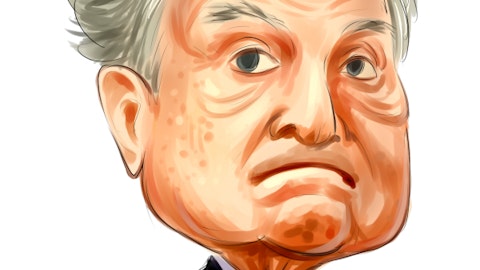But it’s very encouraging that this stuff really does matter, and it’s going to make a difference. Now the question would be how long until we get sort of that hit that inflection point, where people start saying, “oh, this is so much better. I don’t know that yet. But we’re going to keep on experimenting on all these things, increasing the efficiencies. So we can do things faster with a lower cost and at the same time, increasing things for the travelers to make sure they want to come and use our products and our services versus anybody else’s. That’s the plan right now, and I like it. And David, I’m not sure what the second question was.
David Goulden: Yes, I will talk a little bit about a framework for post-COVID recovery because I think that’s important. So we’ve committed that when the dust settles and the market goes back to normal growth rates, whenever that is, we’ll be a larger and faster-growing business. Delivering more EPS and faster-growing EPS than we did before. So larger and faster growing on the top line and the bottom line. So why do we think that is the case? Well, we will have made a ton of progress. So the comparison point is 2019. If 2024 is the year that we get to normalized growth rates, it will be 5 years later. If it’s 2025, it will be 6 years later. But the business is so fundamentally different in, the business we had in 2019. I think we need just to step back and remind you of that.
So, what we’ve done since 2019 and mainly around Booking.com, but other parts of the business have also contributed as well. Back then, we were mainly, an accommodation mainly hotel, mainly agency business. So since then, we have added a significant alternative accommodation business, which is now very sizable and now we’re trying to be for growing quickly. We have — back then, we did very little in payments. Now over half of our business is transacted through Payment. So we built out our payments platform, which is enabling better service for customers and partners. We have built out air taxi and car capability, we didn’t have back in. Back in 2019, we were great at performance marketing. We didn’t do much around merchandising. We’ve now developed a big merchandising arm and capability, but also we’ve refined our performance marketing tools to the level where we really think we can lean into recurring marketplaces and gain share more aggressively than we did back then.
And then, of course, we’ve added our Genius program and enhanced it significantly. So we believe that we have made huge strides since 2019, which is our comparison point when we grew at 8% on the top line, constant currency bookings and revenue. And of course, this year, we are going to be a lot bigger than we were in 2019. But you add all those capabilities together, and we believe we have a fundamentally different and more competitive business that’s providing more value to our customers and partners and is much, much for towards the vision of the Connected Trip than we had back then. And that’s why we are confident that we can grow faster and have a bigger business that grows faster on the top line and the bottom line than we had in 2019.
That is the framework.
Ron Josey: Super helpful. Thank you both.
Operator: Your next question comes from the line of John Colantuoni with Jefferies. Your line is open.
John Colantuoni: Thanks. Thanks for taking my questions. A couple for me. So as more bookings come through the app, I’m curious how repeat rates have trended among more recent cohorts on the app or whether you’re seeing any diminishing returns and stickiness as you move beyond early adopters into the longer tail? And second, are you seeing any patterns in behavior like demand strength in higher priced hotels that’s giving you confidence in consumers’ continued continuation of prioritizing travel spend over other forms of discretionary spend next year? Thanks.
Glenn Fogel: Let me just take that last one, and then I’ll let Dave. I’m not sure what we disclose and what we don’t disclose about your first question. Obviously, it’s an important one. So we say — and we’ve said this several times, several quarters [indiscernible], the same question keeps coming up in different forms of — do we see any softening? Do we see anything decline? Do we see a decrease in star rating? Do you see a decrease in length of stay and things like that. We say no. And that’s what we’ll be — no and no. In terms of why we believe that discretionary spending will continue to travel versus other things, that’s obviously a lot of the survey. So I can maybe a whole bunch of things that are independent, third-party actual people are saying they’re going to do etcetera.
Here’s something more important though. And I really try and stress this is how important the long is in terms of how we think about the business and increasing value. So if we agree that over time, GDP for the world will continue to increase and per capita GDP will continue to increase. It’s fairly logical that as people get wealthier, they’re going to spend more of their money on things that are services or experiences than they are things. Once you going rich enough to have, let’s say an apartment, you have one apartment in generally or you have one sofa. You’re not going to buy a sofa each year. What you’re going to do is you need to get more money is you will travel either more frequently or in a higher level of style travel or you’ll do both.
And we see that over and over again, when you go look at countries and you see what the amount of the — ease to look at his international travel, which is a higher I think you know that’s going to be a higher level for some people. And you see, as the GDP for a person there goes up. You see the amount of going outbound travel increases, too. So that’s why I believe that this is in the long run. We have a great tailwind. The trial will continue to be one of the things that people always are going to want or there’s a lot more of it. And thus, provide a great service, our job is get a safer share, a bigger piece of that pie that is going to continue to grow. And you grow a little bit faster than global GDP. That’s why I believe we have a great future here.
And Steve, I don’t know what we talked or do not disclose regarding his question regarding apps.
David Goulden: I’ll be really quick because we got over time. But there are multiple ways you can book on our property on our platforms directly. You can book directly through the app, book directly on the mobile web and book directly on a desktop or laptop. The app is by far the stickiest those in terms of repeat rates return rates. And of course, the app is where we’re kind of designing to optimize the experience around the Connected Trip, because not only do we want you to be able to book all elements through the app, but also goes with you on the trip, that doesn’t usually happen when you book and print something on one of the other platforms. So it’s very important for us. It’s a big effort. It’s where the Connected Trip is moving towards.
And then what I would just leave you with as a final sort of course, not all customers are created equally and the higher value customers who do more business, where spend more of their total spend with are higher usage of both app and direct by an appreciable amount, compared to the average customer. So the app is very much at the center of that thinking.
John Colantuoni: Okay. Thanks so much.
Operator: And with that, I will hand the call back over to Glenn Fogel for closing remarks.
Glenn Fogel: Thank you. I want to thank our partners, our customers, our dedicated employees and our shareholders. We appreciate your support as we continue to build on the long-term vision for our company. Thank you, and good night.
Operator: This does conclude the conference call. You may now disconnect.
Follow Booking Holdings Inc. (NASDAQ:BKNG)
Follow Booking Holdings Inc. (NASDAQ:BKNG)
Receive real-time insider trading and news alerts





